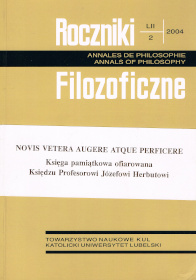Why Science cannot be Value-free
Abstract
Three arguments are developed to support this thesis: (1) Since there is no algorithm for making methodological decisions as to what theory should be accepted, what method should be used, etc, scientists have to pass judgements that are essentially evaluative. Those judgements belong to science. The attempt to save the ideal of value-free science by distinguishing value-free object language and value-laden metalanguage (in which those evaluative judgements would be formulated) does not work. For there are no reasons to expel the methodology of a given science from that science, and even if we made this move, we would finally come to the level of evaluative judgements, unless we accept regressus ad infinitum. (2) Even if the above distinction were tenable, this would not save the ideal of value-free science. For our language is full of the so-called „thick ethical concepts” that are both descriptive and evaluative. They are justifiably used at least in some sciences. We could exclude – by definition - such concepts from science, but this would result in expelling many legitimate disciplines from the realm of science. This would mean not that science was value--free but that we made it so. (3) The fact that scientific results are sometimes expressed by means of ethically thick concepts does not allow us to restrict values involved in science to epistemological values – moral values are involved as well. Moreover, apparently pure methodological concepts such as „good solution” or „sufficient evidence” seem to be also „ethically thick”. Such considerations allow us to draw a conclusion that science possesses intrinsic moral dimension, and separating the epistemic and moral points of view in discussions about science is unjustified.
References
Albert H. (1985), Treatise on Critical Reason, Princeton NJ: Princeton University Press.
Hollis M. (1994), The Philosophy of Social Science: An Intruduction, Cambridge: Cambridge University Press.
Koj L. (1998), Powinności w nauce, Lublin: Wydawnictwo UMCS.
Krasnodębski Z. (1999), M. Weber, Warszawa: Wiedza Powszechna.
Kuhn Th. (1985), Obiektywność, sądy wartościujące i wybór teorii, tłum. S.Amsterdamski, w: tenże, Dwa bieguny, Warszawa: PIW, s. 440-466.
Lacey H. (1999), Is science value-free? Values and scientific understanding, London–New York: Routledge.
Lakatos I. (1995), Falsyfikacja a metodologia naukowych programów badawczych, w: tenże, Pisma z filozofii nauk empirycznych, Warszawa: PWN, s. 3-71.
McMullin E. (1996), Values in Science, w: W. Newton-Smith (red.), A Companion to Philosophy of Science, Cambridge: Blackwell, s. 550-560.
Putnam H. (2002), The Collapse of the fact/value dichotomy and other essays, Cambridge, MA–London: Harvard University Press.
Rudner R. (1953), The Scientist Qua Scientist Makes Value Judgements, „Philosophy of Science”, vol. 20, no. 1, s. 1-6.
Scriven M. (1994), The Exact Role of Value Judgements in Science, in: E.Erwin, S. Genolin, L. Kleiman, Ethical Issues in Scientific Research, New York: Garland Publishing Inc.
Styczeń T. SDS (1966), W sprawie przejścia od zdań orzekających do powinnościowych, „Roczniki Filozoficzne”, 14, z. 2, s. 65-80.
Weber M. (1985a), `Obiektywność' poznania w naukach społecznych (tłum. M.Skwieciński), w: Problemy socjologii wiedzy, Warszawa: PWN, s. 45-100.
Weber M. (1985b), Sens `wolnej od wartościowań' socjologii i ekonomii, tłum. E. Nowakowska-Sołtan, w: Problemy socjologii wiedzy, Warszawa: PWN, s.101-148.
Weber M. (1999), Nauka jako zawód i powołanie, tłum. P. Dybel, w: Z. Krasnodębski, M. Weber, Warszawa: Wiedza Powszechna, s. 199-217.
Zecha G. (1987), Value-neutrality, conscience, and the social sciences, w: G.Zecha, P. Weingartner (red.), Conscience: An Interdysciplinary View, Dordrecht–Boston–Lancaster–Tokyo: D. Reidel Publishing Company, s.59-80.
Copyright (c) 2004 Roczniki Filozoficzne

This work is licensed under a Creative Commons Attribution-NonCommercial-NoDerivatives 4.0 International License.





